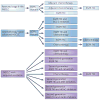Rational, biologically based treatment of EGFR-mutant non-small-cell lung cancer
- PMID: 20966921
- PMCID: PMC3072803
- DOI: 10.1038/nrc2947
Rational, biologically based treatment of EGFR-mutant non-small-cell lung cancer
Abstract
Epidermal growth factor receptor (EGFR)-mutant non-small-cell lung cancer (NSCLC) was first recognized in 2004 as a distinct, clinically relevant molecular subset of lung cancer. The disease has been the subject of intensive research at both the basic scientific and clinical levels, becoming a paradigm for how to understand and treat oncogene-driven carcinomas. Although patients with EGFR-mutant tumours have increased sensitivity to tyrosine kinase inhibitors (TKIs), primary and acquired resistance to these agents remains a major clinical problem. This Review summarizes recent developments aimed at treating and ultimately curing the disease.
Conflict of interest statement
The authors declare competing financial interests; see Web version for details.
Figures






References
-
- Jemal A, et al. Cancer statistics, 2009. CA Cancer J Clin. 2009;59:225–249. - PubMed
-
- Goldstraw P, et al. The IASLC Lung Cancer Staging Project: proposals for the revision of the TNM stage groupings in the forthcoming (seventh) edition of the TNM classification of malignant tumours. J Thorac Oncol. 2007;2:706–714. - PubMed
-
- Hansen HH, et al. Combination chemotherapy of advanced lung cancer: a randomized trial. Cancer. 1976;38:2201–2207. - PubMed
-
- Weinstein IB. Cancer. Addiction to oncogenes — the Achilles heal of cancer. Science. 2002;297:63–64. - PubMed
-
- Hynes NE, Lane HA. ERBB receptors and cancer: the complexity of targeted inhibitors. Nature Rev Cancer. 2005;5:341–354. - PubMed
Publication types
MeSH terms
Substances
Grants and funding
LinkOut - more resources
Full Text Sources
Other Literature Sources
Medical
Molecular Biology Databases
Research Materials
Miscellaneous

